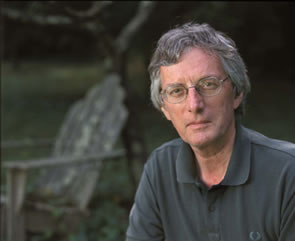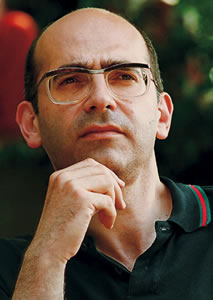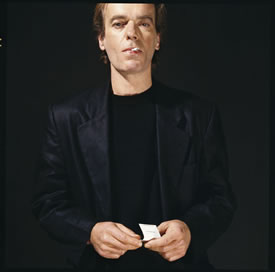De Amerikaanse dichter Charles Wright werd geboren op 25 augustus 1935 in Pickwick Dam, Tennessee. Zie ook mijn blog van 25 augustus 2008 en ook mijn blog van 25 augustus 2009 en ook mijn blog van 25 augustus 2010.
POLAROIDS
Since landscape’s insoluble,
Then loath at last light I leave the landfall, soft and gone.
Or it leaves me.
I’ve got a tune in my head I can’t let go,
Unlike the landscape, heavy and wan,
Sunk like a stone in the growing night,
Snuffed in the heart like a candle flame that won’t come back.
Our world is of little moment, of course, but it is our world.
Thus it behooves us to contemplate,
from time to time,
The weight of glory we should wish reset in our hearts,
About the things which are seen,
and things which are not seen,
That corresponds like to like,
The stone to the dark of the earth, the flame to the star.
_____
Those without stories are preordained to repeat them,
I saw once in the stars.
Unclear who underwrote that,
But since then I’ve seen it everywhere
I’ve looked, staggering
Noon light and night’s meridian wandering wide and the single sky.
And here it is in the meadow grass, a brutish script.
We tend to repeat what we don’t know
Instead of the other way around—
thus mojo, thus misericordia,
Old cross-work and signature, the catechism in the wind.
We tend to repeat what hurts us, things, and ghosts of things,
The actual green of summer, and summer’s half-truth.
We tend to repeat ourselves.
_____
One longs for order and permanence,
An order as in the night sky just north of Mt. Caribou,
Permanence like the seasons,
coming in, going out,
Watchman and wanderer. There’s been no cure, however, and no
Ecstasy in transcendent form, so
Don’t look for me here, incipient, now, in the artifice.
Florence is much on my mind, gold leaf and golden frame,
Infinite background of the masters—
Mayfire of green in the hills,
watchtower and Belvedere,
The Arno, as Dino said, like a dithering snake,
Sad swipe of forgetfulness.
Last chance, a various universe.
_____
A few more rising and setting suns.
Always the spike of the purple lupin, always the folded hands of the dog rose.
Childhood, gentle monk.
His eye extinguished,
someone’s red-gold heart-mouth has sealed his lips.
No wind in the evergreens, no singer, no lament.
Summer surrounds us, and wordless, O blue cathedral.
A few more sorrowful scenes.
The waters murmur, shadows are moist in the upper meadow.
Silence wide as a wasteland through the black streets of the forest.
Over the white eyelids of the dead,
white clover is blossoming.
Late snow like a fallen city shimmers the mountain’s riprap and stare.
Unmullioned window, stained light.
_____
The lapis lazuli dragonflies
of postbelief, rising and falling near
The broken slab wood steps, now one by one, now in pairs,
Are not the dragonflies of death with their blue-black eyes.
These are the tiny ones, the stems, the phosphorescent,
Rising and falling like drowned playthings.
They come and they disappear. They come back and they disappear.
Horizon-hump of pine bristles on end toward the south,
Breath-stealer, cloudless drop cloth
Of sky,
the great meadow beneath like a mirror face down in the earth,
Accepting nothing, giving it back.
We’ll go, as Mandelstam tells us, into a growing numbness of time,
Insoluble, as long as landscape, as indistinct.

Charles Wright (Pickwick Dam, 25 augustus 1935)
De Duitse schrijver Maxim Biller werd geboren op 25 augustus 1960 in Praag. Zie ook mijn blog van 25 augustus 2007 en ook mijn blog van 25 augustus 2008 en ook mijn blog van 25 augustus 2009 en ook mijn blog van 25 augustus 2010.
Uit: The Mahogany Elephant
“He took a new crate of water out of the closet, pushed it straight back in again with his foot, and opened the bottle of wine that had been standing on the kitchen table for the last six weeks. He picked up the glasses and the bottle, and before going back to the living room he took the elephant out of his trouser pocket and threw it in the garbage.
“Jordi,” she said, “I didn’t want wine.”
“No,” he agreed, “it’s still too early for wine.”
“I didn’t drink at all while I was there,” she said.
“That’s a pity,” he said.
“No, I don’t think so.”
“I think it is.”
He poured wine first for himself, then for her, and they clinked glasses. She didn’t look in his eyes, and she drank only a tiny sip before going into the kitchen to fetch a bottle of water. She sat down on the sofa again, as far from him as she had been just before, and began telling him about her travels — but he was barely listening. While she was away he had kept trying to imagine where she was at any given time, and what it was like there, but now he couldn’t care less about India, he just wanted to know what her decision was. Of course, he knew already, but he wanted to hear it from her own mouth. He wanted her to suffer a little, he wanted her to have to say it and feel unhappy about hurting him. No, she would say, we’re not going to get married, Jordi, I know that’s not what I want now, so we’ll never see each other again, the way we agreed.”

Maxim Biller (Praag, 25 augustus 1960)
De Engelse schrijver Martin Amis werd geboren op 25 augustus 1949 in Cardiff, South Wales. Zie ook mijn blog van 25 augustus 2007 en ook mijn blog van 25 augustus 2008 en ook mijn blog van 25 augustus 2009 en ook mijn blog van 25 augustus 2010.
Uit: The Pregnant Widow
“Keith would be staying, for the duration of this hot, endless, and erotically decisive summer, in a castle on a mountainside above a village in Campania, in Italy. And now he walked the backstreets of Montale, from car to bar, at dusk, flanked by two twenty-year-old blondes, Lily and Scheherazade . . . Lily: 5′ 5″, 34-25-34. Scheherazade: 5′ 10″, 37-23-33. And Keith? Well, he was the same age, and slender (and dark, with a very misleading chin, stubbled, stubborn-looking); and he occupied that much-disputed territory between five foot six and five foot seven.
Vital statistics. The phrase originally referred, in studies of society, to births and marriages and deaths; now it meant bust, waist, hips. In the long days and nights of his early adolescence, Keith showed an abnormal interest in vital statistics; and he used to dream them up for his solitary amusement. Although he could never draw (he was all thumbs with a crayon), he could commit figures to paper, women in outline, rendered numerically. And every possible combination, or at least anything remotely humanoid—35-45-55, for instance, or 60-60-60—seemed well worth thinking about. 46-47-31, 31-47-46: well worth thinking about. But you were always tugged back, somehow, to the archetype of the hourglass, and once you’d run up against (for instance) 97-3-97, there was nowhere new to go; for a contented hour you might stare at the figure eight, upright, and then on its side; until you drowsily resumed your tearful and tender combinations of the thirties, the twenties, the thirties. Mere digits, mere integers. Still, when he was a boy, and he saw vital statistics under the photograph of a singer or a starlet, they seemed garrulously indiscreet, telling him everything he needed to know about what was soon to be. He didn’t want to hug and kiss these women, not yet. He wanted to rescue them. From an island fortress (say) he would rescue them . . .”

Martin Amis (Cardiff, 25 augustus 1949)
De Engelse schrijver Frederick Forsyth werd geboren in Ashford, Kent, op 25 augustus 1938. Zie ook mijn blog van 25 augustus 2010.
Uit: The Day of the Jackal
“The last sentence brought a flicker of expression to the grey eyes. ‘No man in the world is proof against an assassin’s bullet,’ said the Englishman. ‘The point is that the chances of escape would not be too high. A fanatic prepared to die in the attempt is always the most certain method. I notice,’ he added, ‘that despite your idealism you have not yet produced such a man.’
‘There are patriotic Frenchmen prepared—’ Casson began hotly, but Rodin silenced him with a gesture.
‘And as regards a professional?’ prompted Rodin.
‘A professional does not act out of fervour and is therefore more calm. Not being idealistic, he is not likely to have last-minute thoughts about who else might get hurt, and being a professional, he has calculated the risks to the last contingency. So his chances of success on schedule are surer than anyone else’s, but he will not even enter into an operation until he has devised a plan enabling him not only to complete the mission, but to escape unharmed.’
‘Do you estimate that such a plan could be worked out to permit a professional to kill de Gaulle and escape?’
‘In principle, yes,’ the Englishman replied. ‘But it would be one of the hardest jobs in the world. But you did not call me here for a chat about political assassination. You called me here because you have concluded that, since your organisation is infiltrated by the secret service, you must have an outsider. And you are right. The only questions that remain are who, and for how much. Now, gentlemen, I think you have had long enough to examine the merchandise.’
Rodin looked sideways at Montclair and raised an eyebrow. Montclair nodded. Casson followed suit. The Englishman gazed out of the window without a shred of interest.”

Frederick Forsyth (Ashford, 25 augustus 1938)
Zie voor nog meerschrijvers van de 25e augustus ook mijn vorige blog van vandaag.
